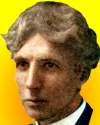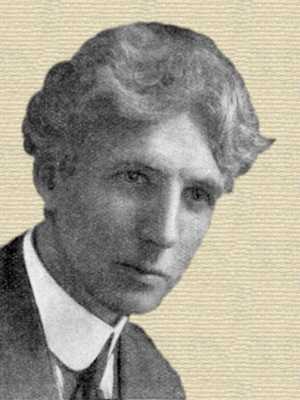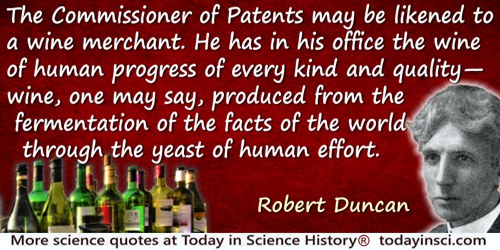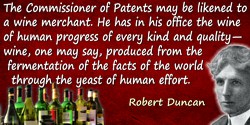 (source)
(source)
|
Robert Kennedy Duncan
(1 Nov 1868 - 18 Feb 1914)
Canadian industrial chemist, teacher and populariser of science who was a preeminent writer interpreting science and advocated partnering scientific research and industry to create new and better consumer products. As director of the Mellon Institute of Industrial Research he brought the learning of the university to the service of industry.
|
Science Quotes by Robert Kennedy Duncan (2 quotes)
Across the road from my cabin was a huge clear-cut—hundreds of acres of massive spruce stumps interspersed with tiny Douglas firs—products of what they call “Reforestation,” which I guess makes the spindly firs en masse a “Reforest,” which makes an individual spindly fir a “Refir,” which means you could say that Weyerhauser, who owns the joint, has Refir Madness, since they think that sawing down 200-foot-tall spruces and replacing them with puling 2-foot Refirs is no different from farming beans or corn or alfalfa. They even call the towering spires they wipe from the Earth’s face forever a “crop”--as if they’d planted the virgin forest! But I'm just a fisherman and may be missing some deeper significance in their nomenclature and stranger treatment of primordial trees.
— Robert Kennedy Duncan
In David James Duncan, The River Why (1983), 71.
The Commissioner of Patents may be likened to a wine merchant. He has in his office the wine of human progress of every kind and quality—wine, one may say, produced from the fermentation of the facts of the world through the yeast of human effort. Sometimes the yeast is “wild” and sometimes the “must” is poor, and while it all lies there shining with its due measure of the sparkle of divine effort, it is but occasionally that one finds a wine whose bouquet is the result of a pure culture on the true fruit of knowledge. But it is this true, pure wine of discovery that is alone of lasting significance.
— Robert Kennedy Duncan
In Some Chemical Problems of Today (1911), 108.
Quotes by others about Robert Kennedy Duncan (1)
My interest in chemistry was started by reading Robert Kennedy Duncan’s popular books while a high school student in Des Moines, Iowa, so that after some delay when it was possible for me to go to college I had definitely decided to specialize in chemistry.
Letter (4 Apr 1932) to Pauline G. Beery. Hagley Museum and Library Collection, Wilmington, Delaware. 1784.) As cited in Matthew E. Hermes, Enough for One Lifetime: Wallace Carothers, Inventor of Nylon (1996), 13.
See also:
- 1 Nov - short biography, births, deaths and events on date of Duncan's birth.
- Harnessing Science to the Factory - article about the Mellon Institute of Industrial Research at the University of Pittsburgh, conceived by Robert Kennedy Duncan - from Popular Mechanics (1914.
- Bread - Chapter from Some Chemical Problems of Today (1911) by Robert Kennedy Duncan.
- Camphor: An Industry Revolutionized - Chapter from Some Chemical Problems of Today (1911), by Robert Kennedy Duncan.



 In science it often happens that scientists say, 'You know that's a really good argument; my position is mistaken,' and then they would actually change their minds and you never hear that old view from them again. They really do it. It doesn't happen as often as it should, because scientists are human and change is sometimes painful. But it happens every day. I cannot recall the last time something like that happened in politics or religion.
(1987) --
In science it often happens that scientists say, 'You know that's a really good argument; my position is mistaken,' and then they would actually change their minds and you never hear that old view from them again. They really do it. It doesn't happen as often as it should, because scientists are human and change is sometimes painful. But it happens every day. I cannot recall the last time something like that happened in politics or religion.
(1987) -- 


